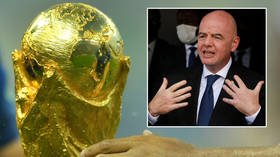As football fans laugh at the thought of a FIFA World Cup every two years, will European Super League-style doomed ideas ever end?

Just when the failed European Super League seemed to have missed out on fatally damaging the reputation of elite football, a World Cup every two years has become a new topic of derision. Fans and players deserve better than this.
After almost 72 years of the World Cup taking place quadrennially – adding another 20 on top, if you include the two editions lost to World War II – it would be complacent to assume that a seemingly untouchable sequence should proceed without being needlessly examined.
The four-year cycle is a long time for football fans. That is as indisputable as it is symbolic of how much supporters cherish the month-long football festival when the World Cup is on. No feasibility studies of the kind sugggested by FIFA this week, put forward by Saudi Arabia at a congress, are required to conclude that it is worth every minute of the wait and a timespan that no one who cares about the sport would wish to curtail.
Infantino, no, no. https://t.co/6fH1wm35kM
— Henry Winter (@henrywinter) May 22, 2021
Do they think players are robots??
— Sarthak (@thisArsenalweek) May 22, 2021
Amid the collateral damage of the European Super League (ESL) being mauled by fans, you might hope that football's guardians would think twice before putting forward more radical brainwaves that appear to be less ignorant of the way audiences feel, more laser-crafted to resemble the polar opposite of the desires held by the people who ultimately make the game the commodity that some clearly see it as.
The ESL was an embarrassment partly because of how little understanding it betrayed from those behind it. The disconnect between investors and customers, if we must call the relationship that, was a damning indictment of the drought of discerment held by many of those at the top of the game about where the line lies between the boundaries of evolution and self-destruction.
Shouldn’t fans get a vote on stuff like this? Talk about ESL ruining football it’s decisions like this and VAR that have a big impact on that fans game.
— The Adored Devils (@theadoreddevils) May 22, 2021
This would really be the end. Do any of these people understand the principle of devaluation? They have a near-sacred trust to maintain this magnificent concept: The Workd Cup. But they’ll run it into the ground to pursue money.
— Ben Aitkenhead (@AitkenheadBen) May 22, 2021
For football now, as the saying might go in the most cringeworthy of business meetings, no idea seems too far-fetched. Fans who once questioned awful goal music replacing the cheers of supporters or matches taking place every day of the week now resemble quaintly naive complainants aiming a paper aeroplane at an unstoppable commercial machine.
Supporters are people, too – some of them even daring to have brains and business sense. Change is inevitable, as the older guard so witheringly said to have been referred to as "legacy fans" by the ESL project know as much as anyone.
Yet another money making racket by FIFA. Talk about diluting the World Cup
— Norfolknchance V 2.0 (@DavidWa98974961) May 22, 2021
The World Cup is the absolute pinnacle of world sport. It is the only genuinely truly global sporting event. It should be cherished and preserved rather than diluted.
— Britannia Sui Iuris (@ENG2Stars1Day) May 22, 2021
FIFA says it wants "fewer yet more meaningful competitive national team matches". So do fans, as the success of the Nations League has shown.
Those longer-standing supporters have already had their loyalty tested by a procession of contentious game-changers, from matches they cannot realistically travel to at the behest of television scheduling to a World Cup taking place in an entirely different season that is logistically onerous to attend. It is patronizing at best to conjecture that newer fans do not feel similarly.
Nooooooooooo Total devaluation and fixture nightmare! Not to mention, these players aren’t robots!! Where is the duty of care here? Yet again all 💰💰💰
— Nigel Davidson (@NBD69) May 22, 2021
💯 yes if it means scrapping the pointless World Cup qualifiers. International football needs a rethink.
— Parklaneyid (@Faber1982N) May 22, 2021
Through the mass disgust, protests, apologies and promises to do fans the honor of listening to their collective voice in the wake of the ESL circus, now would be the perfect time for an amnesty on yet more comically bold, seemingly parodic plans emerging from nowhere.
The lack of appetite for a World Cup every two years is so pronounced that it is almost beyond explaining or debating. As with the ESL, the main result of the proposal looks certain to be the previously unlikely unification of all fans in opposition to it, fostering an immediate appreciation of the way the tournament would be diluted, with indifferent viewers, armchair followers and diehard season ticket holders alike all mystified by the purported need to discuss it.
No, no, no, no - it completely takes out the anticipation, the long wait, the greatness of the competition, the history - no, no, no!!! 🙋🏼♂️👀💁🏼♂️👍
— Niels Lorentzen (@supernillo) May 22, 2021
Absolutely insane! Perfect set up now with Confederation tournaments in between WCs. Will dilute the magnitude of the event. Same goes for the Olympics - every 4 years has a nice rhythm.
— Justin Figgins (@JFiggins) May 22, 2021
The spacing of arguably the most iconic sporting event the world can offer should be sacred, not least because of the mercy it provides in sparing us all from a long and tiresome exploration of the impossible practicalities of the idea, from its incompatibility with beloved tournaments such as the Euros, the Copa America and the Africa Cup of Nations to the demands it would place upon players, who would surely despise the concept as much as they appeared to detest the ESL project.
That this discussion is on the table demonstrates how far there is to go in bridging the gap between the stands and the corridors of power in some cases. There are a vast number of valid debates to be had, including criteria for ownership, wage and transfer caps, the use of technology and, yes, tweaks to tournaments.
Also on rt.com Super League rebels Real Madrid, Barcelona and Juventus lash out at UEFA as they cling to project despite threat of two-year banThe foundations of the World Cup is not one of those subjects: a winter tournament and the expansion of the finals, incorporating 48 teams and altering the number of matches from the 2026 finals, have already frayed the edges of integrity and patience for most supporters.
Enough with the reinforcement of being out of touch. There is ample evidence of that in Real Madrid president Florentino Perez's continued insistence that the ESL is merely on the back-burner, which he probably sees as a warcry rather than a reminder to the public to be vigilant in working against wildly misguided masterplans transfixed on bizarre notions of progress which, in reality, have the capacity to destroy the game.
Fans can wearily ridicule the thought of a World Cup becoming just another showpiece on an ever-more exhaustive, ever-less magical production line of processed fixtures. The risk is that the bar for what once counted as preposterous is raised each time the sacrosanct elements of the game are positioned as bargaining pieces.
By Ben Miller
Also on rt.com As Barcelona & Real Madrid try to plug eye-watering financial holes after the ESL’s collapse, what’s next for the football giants?













